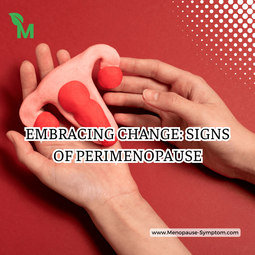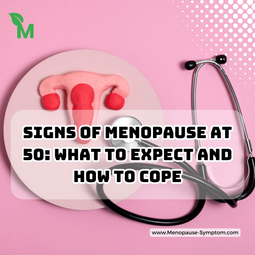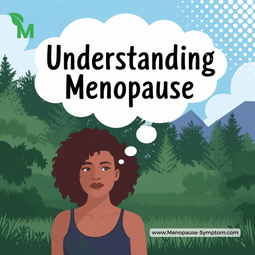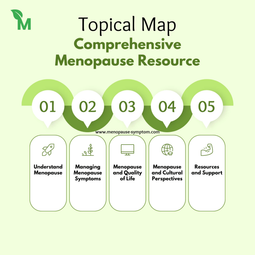Recognizing the Early Signs of Menopause: A Guide for Women
Understanding the Transition
Menopause is a natural biological process that marks the end of a woman's reproductive years. While it typically occurs between the ages of 45 and 55, the journey towards menopause, known as perimenopause, can begin several years earlier. Recognizing the early signs of menopause is crucial for women to navigate this transition with confidence and take proactive steps to manage their health.
The Subtle Shifts: Early Signs to Watch For
Irregular Periods
One of the most common early signs of menopause is changes in your menstrual cycle. You may notice that your periods become irregular, with longer or shorter cycles than usual. Some months, you might skip a period entirely, while other times, you may experience heavier or lighter flows than you're accustomed to.
"Irregular periods are often the first clue that you're entering perimenopause. Pay attention to these changes and track them."
Hot Flashes and Night Sweats
Hot flashes are sudden feelings of warmth that spread over the body, particularly the face, neck, and chest. They can range from mild to intense and may be accompanied by sweating and rapid heartbeat. When these occur at night, they're called night sweats and can disrupt your sleep.
Hot flashes typically last 30 seconds to a few minutes
They can occur several times a day or just occasionally
Some women experience them for a few months, others for years
Mood Changes
Hormonal fluctuations during perimenopause can affect your mood. You might find yourself more irritable, anxious, or prone to mood swings. Some women also report feelings of sadness or loss as they transition away from their reproductive years.
Sleep Disturbances
Difficulty falling asleep or staying asleep can be an early sign of menopause. This can be due to night sweats, anxiety, or hormonal changes affecting your sleep-wake cycle.
Beyond the Basics: Less Common Early Signs
Vaginal Dryness
As estrogen levels decline, you may experience vaginal dryness, which can lead to discomfort during intercourse. This symptom often develops gradually and may be one of the earlier signs of hormonal changes.
Changes in Libido
Some women notice changes in their sex drive during perimenopause. This can manifest as either decreased or increased libido, and it's often influenced by other symptoms like vaginal dryness or mood changes.
Weight Gain and Slowed Metabolism
You might notice that it's harder to maintain your weight, even if your diet and exercise habits haven't changed. This is due to hormonal shifts affecting your metabolism.
The Importance of Early Recognition
Identifying these early signs of menopause is more than just a matter of curiosity. It's a critical step in taking control of your health and well-being during this transition. By recognizing these signs early, you can:
Seek appropriate medical advice and support
Explore treatment options to manage symptoms
Make lifestyle adjustments to support your changing body
Prepare mentally and emotionally for the transition
"Knowledge is power. Understanding what's happening in your body can help you approach menopause with confidence and grace."
Taking Action: What to Do When You Notice Early Signs
Consult Your Healthcare Provider
If you're experiencing any of these early signs of menopause, it's important to talk to your healthcare provider. They can help confirm whether you're entering perimenopause and discuss management strategies tailored to your individual needs.
Keep a Symptom Journal
Tracking your symptoms can provide valuable insights into your body's changes. Note the frequency and severity of symptoms like hot flashes, mood changes, and menstrual irregularities. This information can help your healthcare provider better understand your experience and guide treatment decisions.
Explore Lifestyle Modifications
Many women find relief from early menopausal symptoms through lifestyle changes:
Regular exercise can help with mood, sleep, and weight management
A balanced diet rich in calcium and vitamin D supports bone health
Stress-reduction techniques like meditation or yoga can ease anxiety and mood swings
Consider Hormone Therapy
For some women, hormone therapy can be an effective way to manage early menopausal symptoms. Discuss the potential benefits and risks with your healthcare provider to determine if this option is right for you.
Embracing the Change
While the early signs of menopause can be challenging, it's important to remember that this is a natural transition experienced by all women. By recognizing these signs early and taking proactive steps to manage them, you can navigate this phase of life with confidence and grace.
Remember, every woman's experience with menopause is unique. What's important is listening to your body, seeking support when needed, and viewing this transition as an opportunity for growth and self-discovery.
"Menopause is not an ending, but a beginning – a chance to reinvent yourself and embrace a new chapter of life."
By staying informed about the early signs of menopause and taking action to address them, you're not just managing symptoms – you're setting the stage for a healthy, vibrant future. Embrace this transition, celebrate your journey, and look forward to the wisdom and freedom that often come with this new phase of life.
Source: Team MPS compiled, analyzed and wrote. Please dont reup without source of us. Many thanks.




